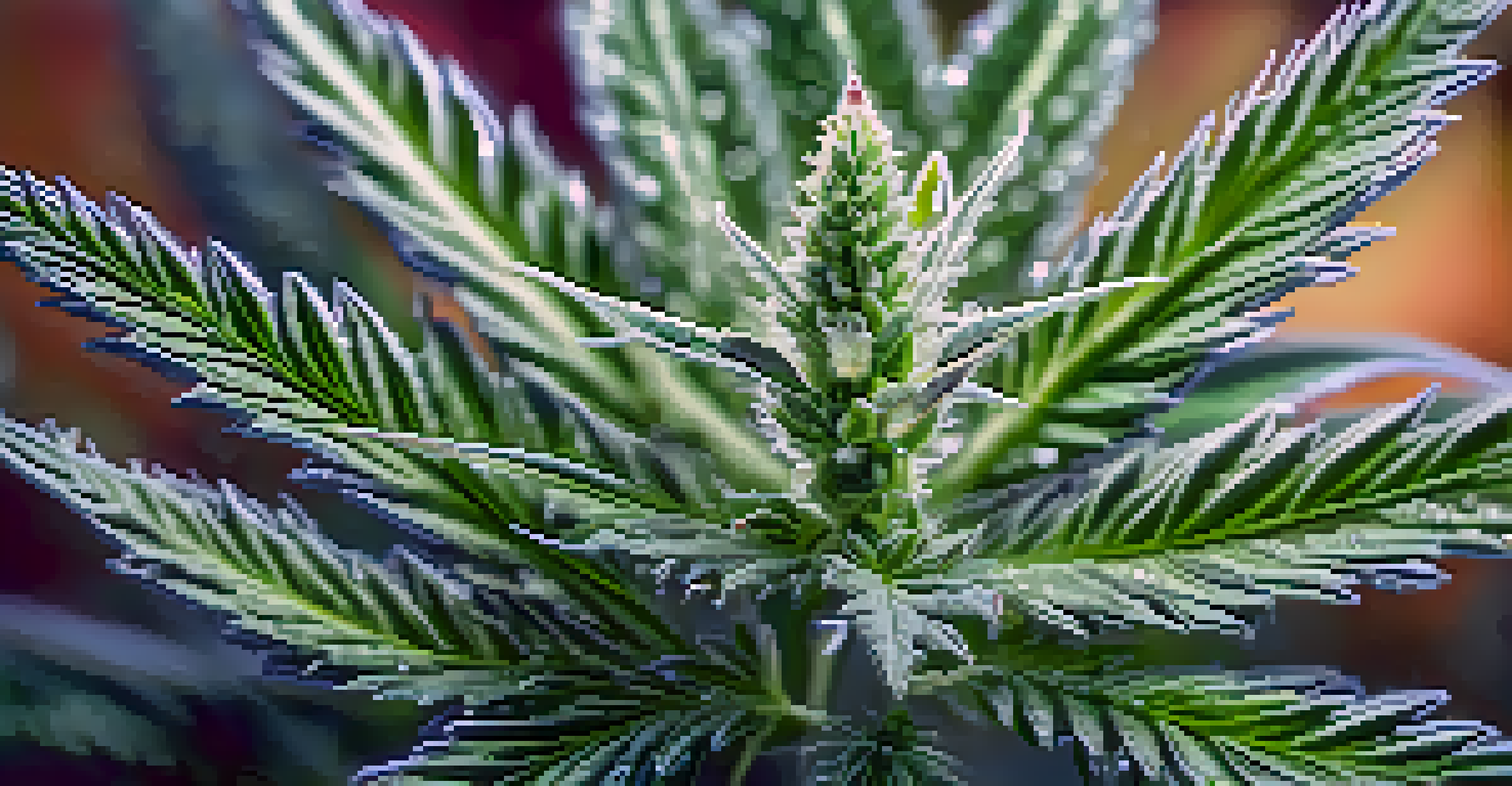The Debate Over Home Cultivation Rights in Legalized Areas

Understanding Home Cultivation Rights and Their Importance
Home cultivation rights refer to the ability of individuals to grow cannabis plants in their own residences. This topic has gained traction as more states and countries legalize marijuana for recreational and medicinal use. Advocates argue that these rights empower users, promote personal freedom, and help reduce the stigma associated with cannabis consumption.
The greatest service which can be rendered to any country is to add a useful plant to its agriculture.
On the other hand, opponents express concerns that allowing home cultivation could lead to increased illegal sales or trafficking of cannabis. They fear that unregulated cultivation may also result in safety hazards, such as mold or pests, which can affect not just the grower but the surrounding community. Balancing these perspectives is crucial for establishing fair and effective regulations.
Understanding the nuances of home cultivation rights is essential for anyone interested in the broader conversation about cannabis legalization. As more regions move toward legalized cannabis, the debate over these rights will only intensify, making it vital for stakeholders to engage in informed discussions.
Current Legal Landscape for Home Cultivation
The legal status of home cultivation varies significantly across jurisdictions. In some areas, individuals are allowed to grow a specified number of plants for personal use, while others prohibit any home cultivation altogether. For instance, states like California and Colorado have embraced home cultivation, allowing residents to grow a limited number of plants, whereas some states still impose strict regulations.

This patchwork of laws creates confusion among consumers and cultivators alike. Many people are unsure of their rights or the legal limits of what they can grow. Moreover, the inconsistency in regulations can lead to unintentional legal infractions, causing unnecessary legal troubles for those simply trying to grow for personal use.
Home Cultivation Empowers Users
Home cultivation rights allow individuals to grow cannabis, promoting personal freedom and reducing stigma.
As the legal landscape continues to evolve, staying informed about the current laws in your area is crucial. This knowledge not only helps individuals avoid legal pitfalls but also empowers them to advocate for their rights in the ongoing debate over home cultivation.
Benefits of Home Cultivation for Individuals
One of the primary benefits of home cultivation is the empowerment it provides individuals. Growing your own cannabis allows users to have control over the quality, strain, and cultivation methods, ensuring a product that meets personal preferences and needs. This level of customization is often unattainable when relying solely on commercial sources.
When we are no longer able to change a situation, we are challenged to change ourselves.
Additionally, cultivating cannabis at home can be a cost-effective solution. Purchasing cannabis from dispensaries can add up quickly, especially for regular users. By growing their own plants, individuals can significantly reduce their expenses and potentially enjoy a sustainable source of their preferred strain.
Home cultivation also fosters a deeper understanding of the plant and its growth process. Many cultivators find joy and satisfaction in nurturing their plants, which can enhance their overall appreciation for cannabis. This connection to the plant can transform the way individuals engage with cannabis, moving from mere consumption to a more holistic experience.
Challenges and Risks of Home Cultivation
While home cultivation has its benefits, it also comes with several challenges that prospective growers should consider. One of the most significant hurdles is the need for knowledge and skill. Successful cultivation requires understanding various factors, including lighting, soil, nutrients, and watering schedules. For many, this learning curve can be steep and overwhelming.
Moreover, there are legal risks associated with home cultivation. Even in places where it is legal, regulations often dictate specific limitations, such as the number of plants or the type of equipment that can be used. Failing to adhere to these rules can lead to fines or legal consequences, which can deter potential cultivators from pursuing their interests.
Legal Landscape is Complex
The legality of home cultivation varies by location, creating confusion and potential legal pitfalls for growers.
Finally, home cultivation can also pose safety risks, particularly if proper precautions are not taken. Issues such as mold, pests, or even improper electrical setups for grow lights can create hazardous situations. Therefore, it is essential for growers to educate themselves on safe practices to mitigate these risks.
Community Impact of Home Cultivation Laws
The debate over home cultivation rights extends beyond individual growers; it also impacts entire communities. Allowing residents to cultivate cannabis can foster a sense of community as neighbors share knowledge, resources, and even harvests. This camaraderie can help build relationships and create a supportive environment for those interested in cannabis culture.
Conversely, there are concerns that unregulated home cultivation could lead to negative community effects. Issues such as odor, security concerns, or even the potential for increased crime in areas with high concentrations of home growers have been cited by opponents. Finding a balance between individual rights and community well-being is a crucial aspect of this ongoing debate.
As communities navigate these challenges, open dialogue and collaboration among residents, lawmakers, and law enforcement are essential. Engaging in discussions about home cultivation can help address concerns while promoting a culture of understanding and respect within neighborhoods.
The Role of Advocacy Groups in the Debate
Advocacy groups play a critical role in shaping the conversation around home cultivation rights. These organizations work tirelessly to educate the public, influence legislation, and provide resources for individuals interested in growing cannabis. By mobilizing supporters, they help amplify the voices of those who believe in the importance of personal cultivation rights.
Many advocacy groups also focus on addressing the concerns of opponents by providing research and data on the benefits of home cultivation. They aim to dispel myths and misconceptions while highlighting responsible practices that can mitigate potential risks. This effort is crucial in fostering informed discussions that move beyond fear-based arguments.
Community Dialogue is Essential
Open discussions among residents, lawmakers, and advocacy groups are crucial for balancing individual rights and community welfare.
Ultimately, advocacy groups serve as a bridge between the public, lawmakers, and the cannabis industry. Their efforts help ensure that the debate over home cultivation rights remains balanced, informed, and respectful, paving the way for more equitable policies in the future.
Future of Home Cultivation Rights in Legalized Areas
As the dialogue surrounding cannabis legalization continues to evolve, the future of home cultivation rights remains uncertain. With changing public attitudes and ongoing research into the benefits and risks of cannabis, lawmakers will need to adapt to meet the needs of their constituents. This dynamic environment presents both challenges and opportunities for advocates of home cultivation.
Many proponents believe that as more states legalize cannabis, there will be an increased push for broader home cultivation rights. This could lead to more uniform regulations across jurisdictions, making it easier for individuals to grow their own cannabis legally. However, achieving this goal will require concerted efforts from advocates, legislators, and community members alike.

The future of home cultivation rights will ultimately depend on the willingness of all stakeholders to engage in collaborative discussions. By fostering an open dialogue that considers both the benefits and concerns associated with home cultivation, communities can work toward creating a legal framework that promotes personal freedom while ensuring safety and accountability.